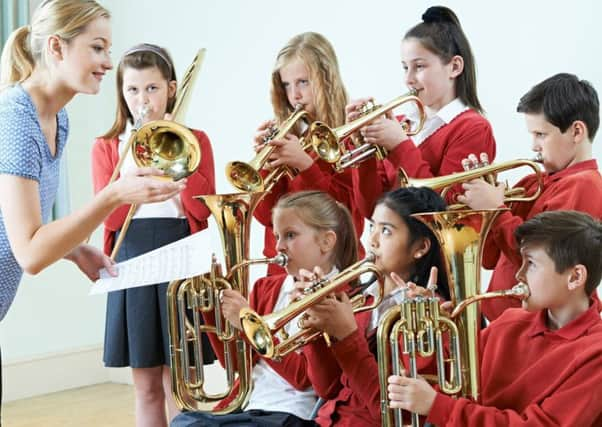Midlothian children encouraged to ditch music amid financial pressures - union claims


Kirk Richardson, convenor of the Educational Institute of Scotland instrumental teachers’ network, said that schools in the area are trying to deter pupils away from taking music at National 5, Higher or Advanced Higher level because, for every child who does so, they are forced to pay £700 out of their budgets for musical instrument tuition.
Instead, students are said to be being persuaded to take alternative subjects instead – or if they do take music, to favour “classroom-taught” instruments such as keyboard and voice, for which the school does not have to fork out extra money.
Advertisement
Hide AdAdvertisement
Hide AdThe situation in Midlothian – which last week U-turned during its budget meeting to make a series of swingeing cuts including proposals to scrap musical instrument lessons in schools altogether following a public backlash – is different to everywhere else in Scotland, where the cost of the instrument tuition is currently absorbed by the council and not passed on to the school.
Under Scottish Government regulations, instrument tuition must be free for any child taking the subject for an SQA exam.
The measure was introduced at the beginning of the current academic year in a bid to plug a hole in the council’s budget.
Mr Richardson said he had heard first-hand accounts of youngsters who had been dissuaded from entering exams in music by teachers. A meeting with parents in Midlothian and music teachers’ organisations was held this week.
Advertisement
Hide AdAdvertisement
Hide AdHe said: “The fact that in Midlothian, a student entering an SQA exam is costing a head teacher £700 means that you only need ten pupils to take an exam and it’s an incredible cost to schools. No headteacher is going to want a department that costs them £30,000 to £40,000 a year more compared to other subjects.
“All of the headteachers are trying to work out ways of getting around this situation.”
Mr Richardson warned that as teachers pushed keen music students towards instruments which can be taught in class such as keyboards and ukuleles, schools would suffer from a lack of variety of instruments – meaning that traditional bands and orchestras would soon disappear.
He added: “What they do is go to the class teacher and tell them ‘It’s keyboard for them’, or singing. This is a legal loophole and it terrifies me that other councils could think it was a good idea and follow suit.
Advertisement
Hide AdAdvertisement
Hide Ad“Youth orchestras and brass bands aren’t going to exist and you’re not going to have any Scottish players unless they are privately taught, which means that instrumental music may become the ownership of private schools.”
Midlothian, like many other local authorities across Scotland, currently charges children not taking an SQA exam in the subject for separate instrumental tuition by visiting teachers, with a fee of £205.50 a year and insists it does want pupils to sit SQA music exams.
A Midlothian council spokeswoman said: “We can categorically state we are encouraging as many pupils as possible, with an interest and talent in music, to sit their SQA music exams.
“Pupils are guided as to what instrument/s to choose based on their aptitude, interest and the availability of that instrument, not cost.”